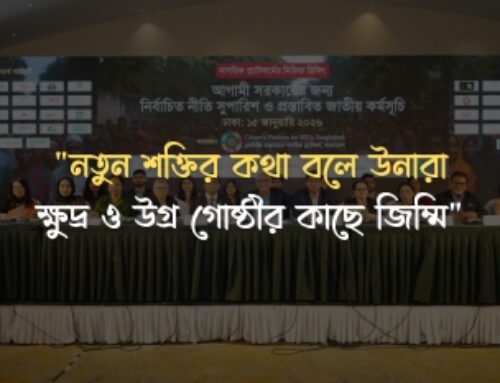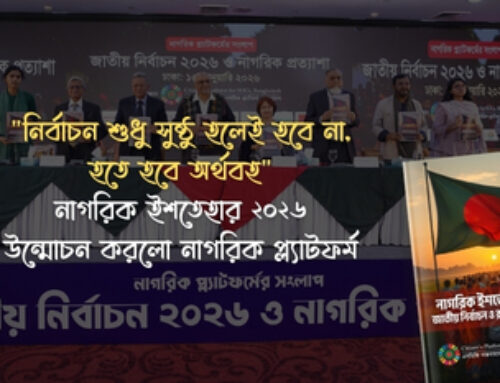
The country’s current economic scenario poses a ‘triangulation of problems’—unabated inflation, snowballing debt, and slowdown of economic growth. Hence, the socioeconomic and political conditions under which the new government is operating have set the stage for potentially low public satisfaction. Together, these factors present formidable challenges for the upcoming budget deliberations.
The statements above were made by Dr Debapriya Bhattacharya, Distinguished Fellow, Centre for Policy Dialogue (CPD) and Convenor, Citizen’s Platform for SDGs, Bangladesh at the dialogue titled ‘New Government, National Budget and People’s Expectations’ on 5 May 2024. The dialogue was organised jointly by CPD and Citizen’s Platform in collaboration with the European Union in Bangladesh.
To guarantee fairness and effectiveness in addressing the social needs of the left-behind communities, it is crucial that the budgeting process incorporates their perspectives, including their needs, priorities, and aspirations. In light of the current socioeconomic situation, the Citizen’s Platform collected budget-related recommendations from its partner organisations to learn about the needs and expectations of the marginalised people.
Additionally, public opinion was collected through a pre-budget survey titled ‘National Budget 2024-25: Your Expectations’ which was conducted nationwide using digital platforms and other means. The Citizen’s Platform has developed a set of budget recommendations based on the submissions from 39 partners, 2,249 Google Form fill-ups and 8,048 social media responses and presented at the dialogue. 66 partner organisations collaborated throughout the process with Citizen’s Platform.
In her introductory remarks, Dr Fahmida Khatun, Executive Director, CPD, highlighted ‘Socioeconomic disparities affect people differently, making the budget an essential tool for equity. Its primary purpose is to address the basic needs of individuals across various classes and occupations, reducing discrimination through targeted taxation, subsidies, and support measures’.
During his keynote presentation, Dr Debapriya, encouraged the government to involve citizens at the local level in delivering and monitoring the budget. This includes selecting participants for social protection programmes and implementing public investment projects, which would help reduce leakage and corruption.
He briefly explained the survey process and highlighted key survey findings. He underscored ‘89 per cent of people supported our initiative while 64 per cent said they had no expectations from the budget’. He added that decent employment, quality education and expanded social security programme are the top priority issues identified by the survey respondents.
To this end, the recommendations, shaped by the views of marginalised communities, call for the expansion of public services and enhanced social protection measures. Urgent calls have been made for decent employment conditions and labour rights. Water, sanitation, and hygiene (WASH) are prioritised, especially for the climate-vulnerable, urban poor, and persons with disabilities (PWDs). Additionally, there is a demand for increased subsidies in sectors like agriculture and small and medium enterprises (SMEs), and for robust food security programmes. The proposals also include the creation of a dedicated budget for left-behind groups — such as PWDs, gender-focused initiatives, children, youth, indigenous populations, char residents, and those vulnerable to climate impacts.
Ms Rasheda K Chowdhury, Executive Director, CAMPE and core group member, Citizen’s Platform, highlighted that while health issues are frequently discussed, nutrition—closely linked to education—is often overlooked. She advocated for the implementation of mid-day meals, noting that past proposals were rejected due to budget constraints.
Professor Mustafizur Rahman, Distinguished Fellow, CPD and core group member, asserted that transparency in budget allocation is a fundamental right. The survey brought to light issues such as transgender rights, children’s rights, and youth expectations, extending beyond budget concerns to include broader economic management and national governance.
Mr Anisul Islam Mahmud, MP, Deputy Leader of the Opposition, Former Minister, Ministry of Environment and Forest and Ministry of Water Resources, Mr MA Mannan, MP, Chairman, Standing Committee on Ministry of Planning, Bangladesh National Parliament and Mr A K Azad, MP, Member, Library Committee, Bangladesh National Parliament were present at the dialogue as Guests of Honour and shared their reflections on the presented recommendations.
Mr A K Azad, MP, Member, Library Committee, Bangladesh National Parliament, emphasised the issue of mismanagement and wastage in the health sector. He also remarked ‘Without ensuring accountability and eliminating corruption, no positive change will come, regardless of any increase in the budget’.
Mr Anisul Islam Mahmud, MP, Deputy Leader of the Opposition, Former Minister, Ministry of Environment and Forest and Ministry of Water Resources, stressed the importance of good governance, revival of the banking sector, preventing wastage, and enhancing efficiency. He noted that addressing these four issues would bring relief to the people. Additionally, he stated that inflation cannot be reduced unless syndicates are dismantled. This inflation disproportionately affects marginalised communities.
Mr MA Mannan, MP, Chairman, Standing Committee on Ministry of Planning, Bangladesh National Parliament, advocated for frugality and emphasised the need to prevent wastage. He suggested that the budget categories require re-evaluation and highlighted the discrepancy in budget allocations, pointing out that they are relatively higher at the divisional level compared to the district levels. He also called on civil society to address this issue through necessary actions.
Representatives and stakeholders from disadvantaged communities presented budget proposals during the dialogue. One of the youth representatives highlighted the vision for Bangladesh to become a high-income country by 2041, emphasising the need to utilise, listen to, and empower youth to achieve this goal. Individuals from climate-vulnerable areas raised concerns about increasing water salinity which hampers agriculture; they suggested that government-provided financial support to farmers through interest-free loans would be beneficial.
Regarding employment and skills, one of the representatives stressed the importance of technical and vocational education to reduce unemployment. Additionally, he called for efforts to bridge the digital divide among marginalised groups by improving digital literacy, enhancing cyber protection, and reducing the cost of digital devices.
During the dialogue, children emphasised the need for employment opportunities and higher education for those growing up in alternative care. Teachers highlighted the necessity for quality training to enhance their effectiveness and advocated for increased budgets for education, including higher salaries for primary and secondary school teachers.
A representative of the urban poor pointed out that while rural poor benefit from safety net programmes, urban poor require allocations for widow allowances, healthcare, and education support.
Representatives from the WASH sector called for increased budget allocations for hard-to-reach areas and marginalised groups, such as the Adivasi community. They also expressed gratitude to the government for tax exemptions on menstrual hygiene products and hoped these would continue.
An acid survivor proposed the establishment of a permanent shelter for acid attack survivors, noting that attacks are still occurring in remote areas of the country.
A representative from the Adivasi community urged for an inclusive budget that supports the production of educational materials in Adivasi languages and provides training for Adivasi teachers.
High-level policymakers, foreign delegates, researchers, development practitioners, academicians, business leaders, civil society representatives, development partners, representatives from the marginalised communities and journalists participated in the dialogue.





Leave A Comment